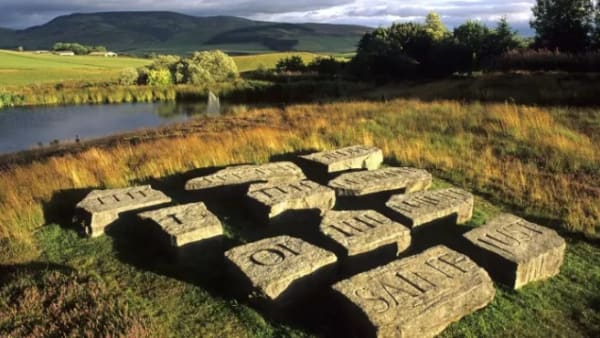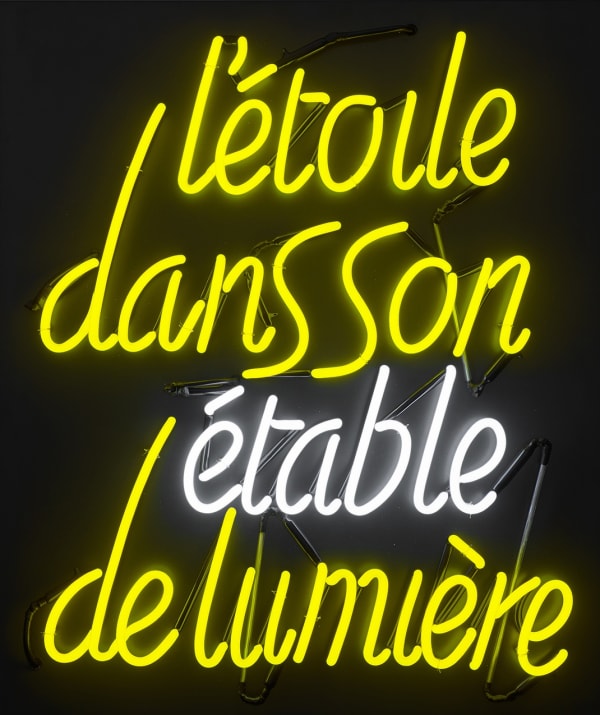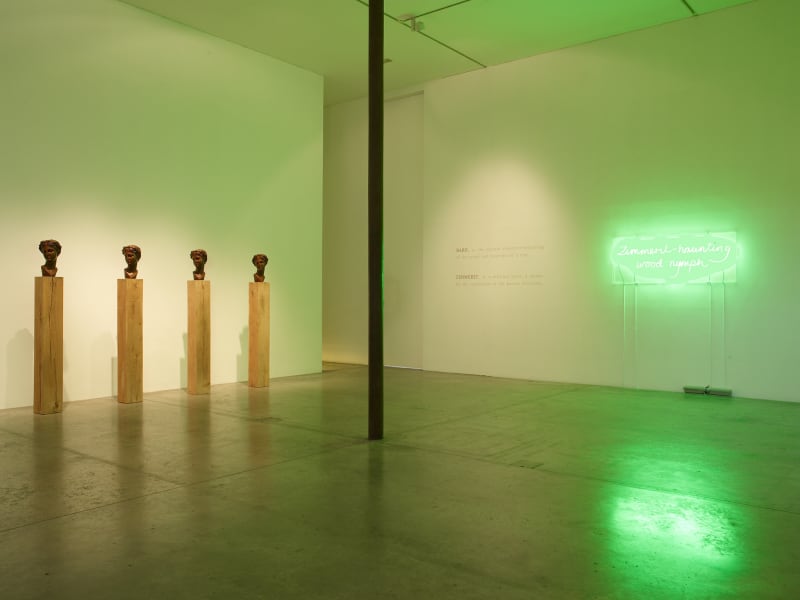Ian Hamilton Finlay: Definitions
Victoria Miro Gallery is delighted to present a unique juxtaposition of Ian Hamilton Finlay's sculpture and a series of text works, termed Definitions. These Definitions present Finlay's own interpretations of the meanings of words, and in conjunction with related sculptural works, display Finlay's adroitness in exploring the written word's materiality.
Ian Hamilton Finlay was at heart a poet, whose prose, rooted in the concrete poetry movement, finds its sublime presentation within the visual field. Informed by numerous sources, his work operates within a context of literature, mythology and classicism. Finlay's ongoing endeavour throughout his lifetime of practice was to expand, liberate and challenge our understanding and perception of the written word, its limitations and its role in unspoken, communicative and aesthetic exchange. He achieved this through poetry rendered in many materials and forms.
Finlay's adept use of syntax and narrative configuration weaved refined distinctions with a lyrical philosophy. His skill lay in his unique ability to break down complex ideas into coherent single words and short phrases, infused with Finlay's characteristic wit and, often, wry humour.
This exhibition reveals how Finlay plays with our presuppositions and undermines our very understanding of language. His Definitions are interspersed at considered at precisely choreographed points through the exhibition, initiating a narrative journey for the visitor through the consideration of text and object. No visitor's reading shall be the same, as these open-ended propositions allow for endless interpretations of work and meaning. The intricate and multi-layered relationships established between language, text, object and visitor are integral to an enduring search for the pure, which prevailed within Finlay's practice.
Born in 1925 in Nassau, Bahamas, Ian Hamilton Finlay was a philosopher, sculptor and poet who reinvigorated the classical tradition in his art. Finlay's diverse production encompassed a variety of creative forms including prints, poems, books, inscriptions, neons, sculptures, permanent installations and landscape design, all celebrating the sustaining power of words. The purest kind of conceptual artist, Finlay was sensitive to the formalist concerns (colour, shape, scale, texture, composition) of literary and artistic modernism. In 1961 he founded Wild Hawthorn Press with Jessie McGuffie, mainly to introduce contemporary artists to Scotland, and which over the years came to concentrate exclusively on Finlay's printed works. His lifetime's work, the garden at Little Sparta, Stonypath, Scotland, begun in 1966, most fully realises the movement of words and language into the world. Ian Hamilton Finlay died 27 March 2006, aged 80.
-

Ian Hamilton Finlay: Fragments is reviewed in Sculpture Magazine
May 12 2025'This much-deserved centenary celebration demonstrates the continued relevance of his questioning work.'Read More -

Ian Hamilton Finlay’s Republic is The Week in Art’s Work of the Week
May 6 2025For The Art Newspaper’s The Week in Art podcast, Ben Luke spoke to Stephen Bann about this sculptural work, currently on view at the gallery...Read More
-

Ian Hamilton Finlay’s son Alec Finlay on the centenary of his father's birth in The World of Interiors
April 23 2025'He experienced language as a Heraclitan and oracular medium. To him, the poem was an exemplary device that had a gift for revealing the metamorphoses words contain.'Read More -

Ian Hamilton Finlay’s Little Sparta featured in the Financial Times
April 17 2025'As a whole, Little Sparta is “like a cryptic crossword puzzle. It’s a place that allows you to think.”'Read More
-

The Observer reviews Ian Hamilton Finlay at the National Galleries of Scotland
March 23 2025★★★★ 'His is an art of distillation, juxtaposition, thrift and contemplation... Finlay understood as few other artists the emotional power of letters cutting into form, shape and colour.'Read More -

Exhibitions celebrating the centenary of Ian Hamilton Finlay feature in The Times Scotland
March 1 2025'...Finlay saw himself as a disruptor, someone who challenged the establishment and picked quarrels with it, whenever he felt its power was being misused.'Read More
-

A centenary display of works by Ian Hamilton Finlay at National Galleries of Scotland
February 24 2025On view at Modern Two from 8 March–26 May 2025, the display includes sculptures, prints and a room-size installation as well as extensive archival material....Read More -

Ian Hamilton Finlay features in Landscape and Imagination: From Gardens to Land Art at Compton Verney
March 2 2024The exhibition (21 March–16 June 2024) explores the beauty of nature, reimagined and reinterpreted through the hands of artists and landscape designers who throughout history...Read More
-

Marine: Ian Hamilton Finlay at City Art Centre, Edinburgh
May 22 2021This major exhibition (22 May–3 October 2021) focuses on the maritime theme in Finlay’s work. It was a central element of his art, and one...Read More -

Ian Hamilton Finlay is featured in the UCL exhibition Witnessing Terror: French Revolutionary Prints
January 6 2020The exhibition (14 January–12 June 2020) showcases UCL Art Museum’s unique holdings of prints related to the French Revolution and draws out the contemporary relevance...Read More
-

Ian Hamilton Finlay in Machines à Penser at Fondazione Prada, Venice
May 24 2018Curated by Dieter Roelstraete, the exhibition (26 May–25 November 2018) explores the correlation between conditions of exile, escape and retreat and physical or mental places...Read More -

An Ian Hamilton Finlay exhibition and talk are a focal point of this year’s Ilkley Literature Festival
August 1 2017The exhibition (30 September 2017), Ian Hamilton Finlay’s Visual Poetry, at Manor House, features sculptures and inscriptions, prints, letters and images drawn from the collection...Read More
-

Hyperallergic writes about Concrete Poetry: Words and Sounds in Graphic Space, featuring Ian Hamilton Finlay
June 3 2017An Eye for Words: Concrete Poets at the Getty Concrete Poetry focuses on the purists of the movement, particularly the Brazilian Augusto de Campos, the...Read More -

Jonny Bruce writes about Ian Hamilton Finlay's Little Sparta, in the Financial Times
March 28 2017The artist-gardeners who aim to plant a subversive message. By Jonny Bruce Finlay’s garden at Stonypath, outside Edinburgh, has become a place of pilgrimage for...Read More
-

Ian Hamilton Finlay in Concrete Poetry: Words and Sounds in Graphic Space at Getty Research Institute
March 23 201728 March - 30 July 2017 Drawn principally from the Getty Research Institute's collection of prints, artists' books, journals, and manuscripts documenting the international concrete...Read More -

Grayson Perry and Ian Hamilton Finlay in Creating the Countryside at Compton Verney
March 9 2017Creating the Countryside: Thomas Gainsborough to Today Sat 18 March 2017 – Sun 18 June 2017 , 11.00am – 5.00pm. Compton Verney’s 2017 season will...Read More
-

Ian Hamilton Finlay at St Paul's Cathedral
December 12 2016New art installation for Advent and Christmastide at St Paul's Cathedral The star in its stable of light A work by Ian Hamilton Finlay has...Read More -

Ian Hamilton Finlay: Neoclassicism and Revolution at Pallant House Gallery
October 24 2016A display of prints and multiples (22 October 2016 - 19 February 2017) by the Scottish artist and poet Ian Hamilton Finlay (1925-2006), best known...Read More


